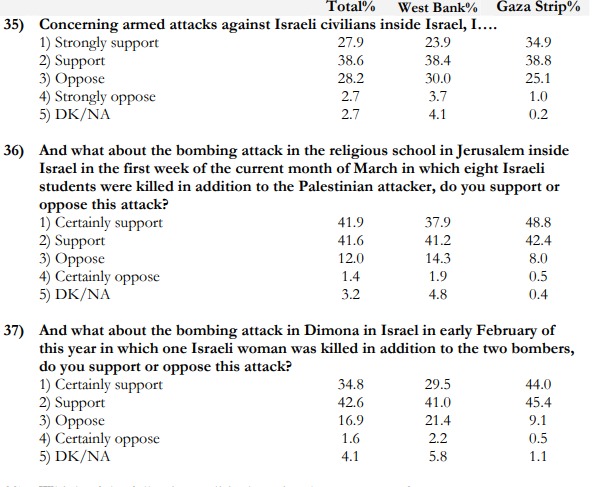Bassem Eid: The perpetual dictator and the missing peace: The story of Mahmoud Abbas
During these long 18-plus years, peace has eluded the region primarily through Abbas’s personal obstinance. In 2008, Abbas walked away from a third Israeli peace offer that would have relinquished Israeli control over the Old City, location of the holiest site in the Jewish faith, the Temple Mount. Under his rule, Palestinian public education and news media fully normalized and are even saturated in antisemitism, often featuring explicit calls for violence against Jews. Abbas’s public statements and speeches place all of the onus for peace on Israel, as the Anti-Defamation League’s Jonathan Greenblatt succinctly wrote: “The Abbas approach should be rejected by the international community, not merely because of its bias against Israel, but also because it recycled the same-old ideas that have pushed Palestinians down the pointless loop of delegitimizing Israel rather than the hard climb of reaching compromise.”Netanyahu government breaks sharply with predecessor in dealings with PA
Over 2 million Palestinians live under the tyrannical power of Abbas’s PA in the West Bank, including me and many of the people I care most about. Abbas is the real occupier of our cities and our homeland, not our future partner Israel, which has consistently had a majority in favor of peace and not Benjamin Netanyahu, a leader who has explicitly supported the idea of a Palestinian state so long as Israel maintains the necessary security controls.
Abbas has offered us neither democracy nor independence, but we remain a free people. It is time for the Palestinian nation to reach a new agreement with Israel and the international community, abolishing the dictatorial rule of Abbas and the PLO and instead granting our people what we truly deserve: peace with dignity alongside our neighbor, the Jewish State of Israel.
On Jan. 5, Israel’s Security Cabinet approved a series of retaliatory measures against the Palestinian Authority. These included sanctions against senior Palestinian officials, the withholding of Palestinian funds collected by Israel and a halt to illegal Palestinian construction in Area C of Judea and Samaria.
The measures were swiftly implemented: Palestinian Foreign Minister Riyad al-Maliki, on returning from a trip to Europe, found himself waiting in line at the Allenby Bridge crossing after Israel stripped him of his VIP pass. On Sunday, Israeli Finance Minister Bezalel Smotrich announced the transfer of $40 million in confiscated Palestinian funds to Israeli victims of terrorism, money that would have gone to support terrorists had it reached P.A. hands.
“The difference that we’re seeing, the actions of the government on all fronts, is really quite substantial,” IDF Lt. Col. (res.) Maurice Hirsch, director of legal strategies for Palestinian Media Watch, told JNS.
The measures, coming less than two weeks into the tenure of the country’s new government, are partly a response to the P.A.’s orchestration of a vote at the United Nations on Dec. 30 calling on the International Court of Justice to render an opinion on the legal status of Judea and Samaria. (Al-Maliki’s VIP pass was reportedly confiscated because of a meeting he had at the International Criminal Court in the Hague.)
“What the government did is focus on punishing the P.A. leadership. The government is saying that there’s a cost and a consequence for these actions,” said Hirsch. “P.A. subversion at the United Nations is a complete and utter breach of the Oslo Accords. The VIP permits are a function of the Accords. There’s no reason why we should have to continue as if nothing happened. They have to pay the price,” he added.
Israel’s move to freeze taxes and tariffs it collects on behalf of the P.A.—and which the P.A. uses to award terrorists and their families as part of its “pay-for-slay” program—is also a welcome decision, according to Hirsch. An Israeli law to withhold the funds has been on the books since 2017, but only half-heartedly enforced, he noted. “This will be particularly effective and forceful with the P.A.,” he said, as it will cost them 100 million shekels ($28 million) a month.
US: Israel’s Withholding of Funds over Palestinian Terrorism ‘Exacerbates Tensions’
US State Department spokesman Ned Price on Monday described a series of Israeli measures meant to curb and punish Palestinian terrorism as a “unilateral move” that “exacerbates tensions.”Palestinian Prime Minister calls new Israeli sanctions 'final nail in the coffin'
Israel’s Security Cabinet last week approved the measures in response to what it described as the Palestinian Authority’s ongoing “political and legal war” against the Jewish state. The previous week, the U.N. General Assembly, at the urging of the P.A., passed a resolution calling on the International Court of Justice to “render urgently an advisory opinion” on Israel’s “prolonged occupation, settlement and annexation of Palestinian territory.”
“We have continued to make the point that unilateral actions that threaten the viability of a two-state solution, unilateral actions that only exacerbate tensions—those are not in the interests of a negotiated two-state solution,” said Price.
He added that Washington has “been consistent in our own strong opposition to the request for an ICJ advisory opinion concerning Israel…. We believe this action was counterproductive.”
As part of the measures, Israel on Sunday transferred $39.5 million of taxes and tariffs collected for the P.A. to the victims of terrorism and their families.
At a press conference, Israeli Finance Minister Bezalel Smotrich said, “We promised to fix this, and today we are correcting an injustice. This is an important day for morality, for justice and for the fight against terrorism. There is no greater justice than offsetting the funds of the Authority, which acts to support terrorism, and transferring them to the families of the victims of terrorism.”








.jpg)

















.jpg)




